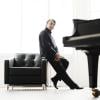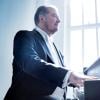
It’s been a whirlwind decade for pianist Seong-Jin Cho, who in 2015 became the first South Korean to win the gold medal at the International Chopin Piano Competition in Warsaw.
Cho, at the time a 21-year-old Paris Conservatory student, catapulted to stardom, following the paths of such past Chopin Competition winners as Martha Argerich and Krystian Zimerman. Tickets to his 2016 post-victory gala concert in Seoul were in such high demand that the online ticket-reservation system reportedly crashed. He signed with Deutsche Grammophon and made his debut with the Berlin Philharmonic in 2017.
Since then, Cho has maintained an intense touring schedule and worked to expand his discography, which currently consists of eight studio albums (only two of which have featured music by Chopin). By recording works by Handel, Mozart, Schubert, Franz Liszt, Claude Debussy, and Alban Berg, Cho hopes to avoid becoming known solely for his Chopin interpretations. His recording of Maurice Ravel’s complete solo piano music was released on Jan. 17, and another album, featuring both of Ravel’s piano concertos and recorded with the Boston Symphony Orchestra, is expected to follow on Feb. 21.

Cho, now 30, says he’s grown “more chill” about how others perceive him. “I decided to become a pianist because I like the music.” he recently told SF Classical Voice “And for me. So if someone says, ‘Seong-Jin is a Chopin specialist,’ I can say, ‘Thank you, but I know that I’m not.’”
Cho, who resides in Berlin, chatted with SFCV via video call before performing Ravel’s complete solo works in recitals in San Francisco (Feb. 9) and Los Angeles (Feb. 11). He’ll also join the Los Angeles Philharmonic and conductor Paavo Järvi for Ravel’s Concerto in G Major (Feb. 13–16). Our conversation has been edited for length and clarity.
By the time this interview is published, your recording of Ravel’s solo piano music will be released. How are you feeling about it?
It was a real challenge to record all the music, especially the solo piano music. I spent like six days recording that. And it was my first time recording one composer’s complete music. So [now] I can say I understand his music more deeply and better because I can see the whole picture. Recording the concertos with the Boston Symphony and [conductor] Andris Nelsons was a very smooth process because I feel that the Boston Symphony, somehow, has French DNA in their blood.
Is there anything you do differently when you’re recording in a studio versus performing onstage for a live audience?
I can’t say I’m less nervous when I record — it’s [actually] more stressful sometimes. Every recording is different, but [with this album], I really tried to concentrate on the details. I tried to follow the markings Ravel wrote as much as I could. For live performances, [I’m] full of adrenaline, and I can get some energy from the audience, so it’s completely different. I take more risks.
You mentioned that recording all of Ravel’s music gave you a new understanding of the composer. What are some of the things you learned throughout the process?
Ravel was not a composer like [Alexander] Scriabin. If you listen to Scriabin’s early work, it totally sounds like Chopin’s music, and his late work sounds like a completely different person’s. Ravel’s musical language does not change so much thematically. Still, when you hear his early works, like the Sérénade grotesque or the Menuet antique, it’s [noticeably] different from Le Tombeau de Couperin. In the middle section of the Menuet antique, you can somehow feel a Schubertian melodic line. When I performed the Valses nobles et sentimentales, I thought that Ravel was kind of influenced by Schubert because [here are these] very noble and elegant waltzes. But [Ravel’s] language totally developed [as his own].
When you listen to or discover Ravel’s music for the first time, you can say he’s a very impressionistic composer. But his music is totally different from Debussy’s, [which] is more romantic or imaginative. Ravel’s music is also very imaginative, but he was very clear in composing. He really knew what he wanted to express, so his music was more orchestral than abstract.

Once you release a recording, do you ever listen to it again? Are there any albums of yours that you would like to revisit?
Never. [Laughs.] My personality is rather introverted, not confident. My live performance from the Chopin Competition of Chopin’s Preludes was released right after I won. So maybe in the future, perhaps I’m not going to re-record them, but I’d like to perform them again.
This is your first time recording the complete works of any composer. How did you decide that Ravel was the right fit for such a project?
I wanted to celebrate the 150th anniversary [of his birth] this year. And I studied in Paris for five years. I was exposed to Ravel’s music so much [then]. I cannot say that I feel really comfortable when I perform his music because it’s always so demanding technically, musically. But it feels very natural, maybe because I was exposed to [it] for so many years.
You’ve said Ravel was one of your childhood favorite composers. What was your first memory of playing his music?
In 2005. I was 11 years old. “Alborada del gracioso” from Miroirs. And before learning Ravel’s music, I had been playing J.S. Bach, Beethoven, Mozart, Chopin — Classical or Romantic music. It was my first time encountering 20th-century music. The first thing I [thought] was, “Oh, it is so difficult.” Technically, it was next level. And then I was fascinated by [Ravel’s] unique harmony. So it was a totally new world for me, and since then, I’ve been loving his music.
In other interviews, you’ve shared that you were advised to learn all of the music that you would someday want to have in your repertoire before the age of 40 and that you’ve put together such a list in a notebook. What works and composers are on it?
Schubert’s late sonatas, Beethoven’s Piano Sonata No. 5, Brahms’s Klavierstücke [Op. 118/119]. I have to look, but I think there are sonatas [by Sergei Prokofiev that] I’ve never done [as well].
Are there any living composers that you would like to collaborate with?
I have some plans to do a world premiere next year, but I cannot name [the piece] right now. I’m very interested in working with contemporary composers. I had one experience in 2023, premiering Thierry Escaich’s [Études symphoniques]. It was great that I was able to ask questions to the composer directly, which I cannot do [with] Ravel or Mozart.

I think you would expect many in the Bay Area’s Korean American community to support your concerts. And certainly for many young pianists, you’re a huge musical inspiration. When you were a kid, who were the pianists you looked up to?
Krystian Zimerman and Radu Lupu, but they didn’t come to Korea when I was [there]. Some Korean pianists, like Sunwook Kim, who is now a very close friend of mine. He was my big inspiration.
I think it was when I performed with the LA Phil in December 2023 that I got a letter from a Korean lady. She wrote that her son was 1 year old or maybe she was pregnant when I did the Chopin Competition. And now her son is an elementary school student and is learning the piano. [Laughs.] I felt like, “Oh, I’m getting old. Time flies.”
Shortly after winning the Chopin Competition, you were asked in an interview about your advice for young pianists. You said that you didn’t feel ready to give advice, but maybe in 10 years you would. Now that it’s been 10 years, I’m wondering if you feel ready.
Since I was a teenager, I’ve gotten so much different advice from different people, but in the end, I followed my instincts. I don’t know if I made good decisions or not, but making decisions is one of the most important things in life. What to do, what to play, who to meet.

I cannot [give advice in general] because it really depends on people and personalities. But instinct is the most important thing. It can be a small thing or a big thing. I went to Paris to study [because] my instincts said I had to go. There was not too much preparation before deciding this.
And doing the Chopin Competition: Some people, like teachers, were not so happy about my decision to participate because they thought I should concentrate on my studies more. If you decide to participate in a competition, you have to concentrate solely on it, so it can limit your repertoire. But my instincts said, “I have to do it right now,” so I did.
What do you have coming up that you’re excited for?
For this next year, I’m going to do more chamber music, which I haven’t done much since I won the Chopin Competition. A year ago, I met a great musical partner [whom] I can’t name right now, but [we’ll] tour and build up our relationship. I also have plans to do some quartets or trios, but the tour is a duo. If I’m being really honest, the reason why I wanted to play more chamber music was I really like Brahms’s [works]. The partner is a violinist, so I immediately want to play Brahms’s Violin Sonata No. 1.




